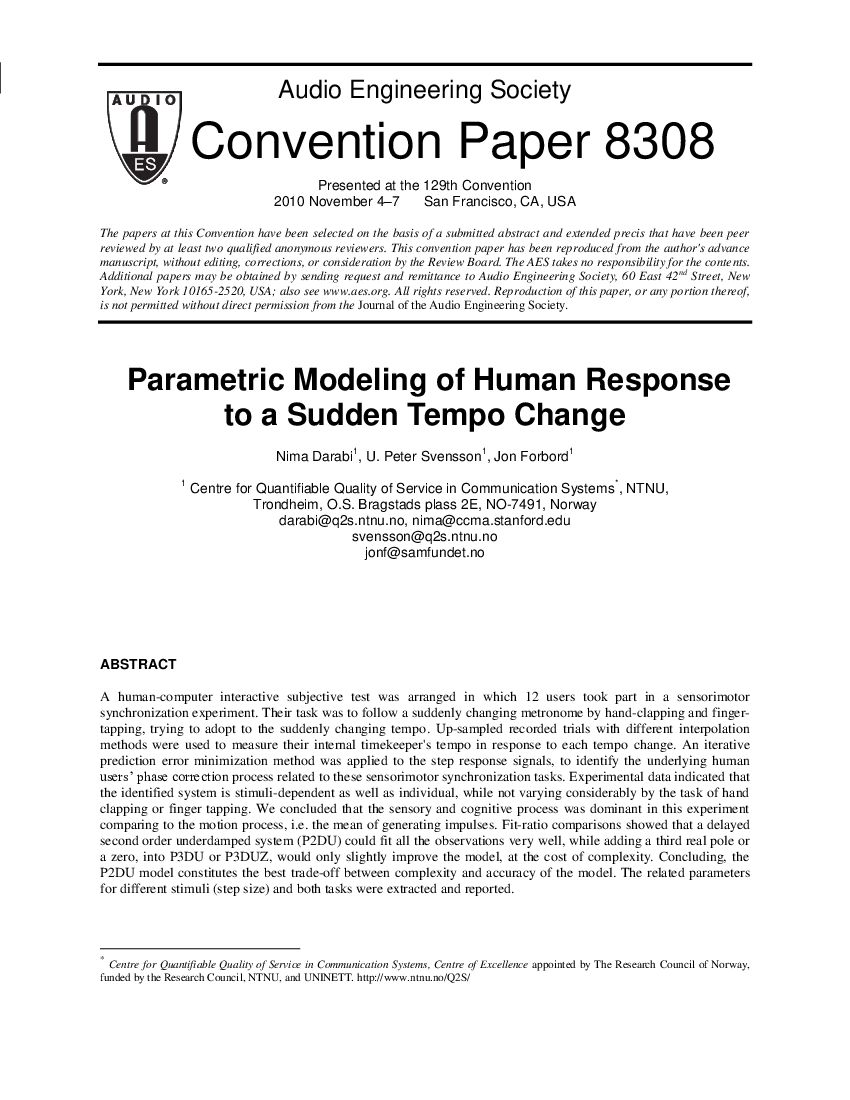Home / Publications / E-library page
You are currently logged in as an
Institutional Subscriber.
If you would like to logout,
please click on the button below.
Home / Publications / E-library page
Only AES members and Institutional Journal Subscribers can download
A human-computer interactive subjective test was held in which 12 users took part in a sensorimotor synchronization experiment. Their task was to tap with a suddenly changing metronome by hand-clapping and finger-tapping trying to adopt with the change. Up-sampled recorded trials with different interpolation methods were used to measure their internal timekeeper`s tempo in response to each tempo step. An iterative prediction error minimization method was applied to the step response signals, to identify the underlying human users’ phase correction process related to these sensorimotor synchronization tasks. Experimental data indicated that the identified system is stimuli-dependant and individual-dependant, while not varying considerably by the task of hand clapping or finger tapping. We concluded that the sensory and cognitive process was dominant in this experiment comparing to the acting part. Fit ratio comparison showed that a delayed second order underdamped system (P2DU) could fit all the observations very well, while adding a third real pole or a zero, P3DU and P3DUZ would slightly improve the model in some cases with the cost of complexity. P2DU was considered as the trade-off between complexity and accuracy of the model. The related parameters for different stimuli (step size) and both tasks were extracted and reported.
Author (s): Darabi, Nima; Forbord, Jon; Svensson, Peter
Affiliation:
Norwegian University of Science and Technology, Trondheim, Norway
(See document for exact affiliation information.)
AES Convention: 129
Paper Number:8308
Publication Date:
2010-11-06
Import into BibTeX
Session subject:
Auditory Perception
Permalink: https://aes2.org/publications/elibrary-page/?id=15730
(768KB)
Click to purchase paper as a non-member or login as an AES member. If your company or school subscribes to the E-Library then switch to the institutional version. If you are not an AES member Join the AES. If you need to check your member status, login to the Member Portal.

Darabi, Nima; Forbord, Jon; Svensson, Peter; 2010; Parametric Modeling of Human Response to a Sudden Tempo Change [PDF]; Norwegian University of Science and Technology, Trondheim, Norway; Paper 8308; Available from: https://aes2.org/publications/elibrary-page/?id=15730
Darabi, Nima; Forbord, Jon; Svensson, Peter; Parametric Modeling of Human Response to a Sudden Tempo Change [PDF]; Norwegian University of Science and Technology, Trondheim, Norway; Paper 8308; 2010 Available: https://aes2.org/publications/elibrary-page/?id=15730